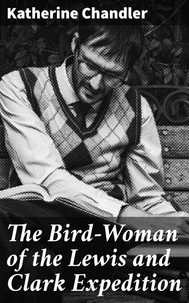The Bird - Woman of the Lewis and Clark Expedition
Par :Formats :
Disponible dans votre compte client Decitre ou Furet du Nord dès validation de votre commande. Le format ePub est :
- Compatible avec une lecture sur My Vivlio (smartphone, tablette, ordinateur)
- Compatible avec une lecture sur liseuses Vivlio
- Pour les liseuses autres que Vivlio, vous devez utiliser le logiciel Adobe Digital Edition. Non compatible avec la lecture sur les liseuses Kindle, Remarkable et Sony
 , qui est-ce ?
, qui est-ce ?Notre partenaire de plateforme de lecture numérique où vous retrouverez l'ensemble de vos ebooks gratuitement
Pour en savoir plus sur nos ebooks, consultez notre aide en ligne ici
- Nombre de pages24
- FormatePub
- ISBN859-65--4717712-8
- EAN8596547177128
- Date de parution15/08/2022
- Protection num.Digital Watermarking
- Taille448 Ko
- Infos supplémentairesepub
- ÉditeurDIGICAT
Résumé
In "The Bird-Woman of the Lewis and Clark Expedition, " Katherine Chandler intricately weaves historical fact with imaginative narrative, shedding light on the often-overlooked contributions of women in exploration. The book adopts a lyrical prose style, evocatively capturing the landscapes and challenges faced by the expedition. Chandler's writing not only invites readers to witness the vast wilderness but also to contemplate the gender dynamics that shaped this monumental American journey.
Set against the backdrop of early 19th-century America, the story centers on Sacagawea, a pivotal figure whose role as a guide and translator was crucial yet historically submerged beneath the male-dominated accounts of exploration. Katherine Chandler's rich background in anthropology and her passion for women's studies inform her narrative approach, providing both depth and authenticity. Her scholarly research, combined with a heartfelt understanding of Sacagawea's experiences, allows Chandler to resurrect the voices of those who have been silenced in traditional narratives.
This confluence of personal engagement and academic rigor sheds new light on historical events that have shaped American identity. Readers looking for a profound exploration of history through a feminist lens will find "The Bird-Woman of the Lewis and Clark Expedition" an essential addition to their library. This book not only enriches our understanding of Sacagawea's vital role but also encourages reflection on the broader themes of agency and recognition in historical storytelling.
Set against the backdrop of early 19th-century America, the story centers on Sacagawea, a pivotal figure whose role as a guide and translator was crucial yet historically submerged beneath the male-dominated accounts of exploration. Katherine Chandler's rich background in anthropology and her passion for women's studies inform her narrative approach, providing both depth and authenticity. Her scholarly research, combined with a heartfelt understanding of Sacagawea's experiences, allows Chandler to resurrect the voices of those who have been silenced in traditional narratives.
This confluence of personal engagement and academic rigor sheds new light on historical events that have shaped American identity. Readers looking for a profound exploration of history through a feminist lens will find "The Bird-Woman of the Lewis and Clark Expedition" an essential addition to their library. This book not only enriches our understanding of Sacagawea's vital role but also encourages reflection on the broader themes of agency and recognition in historical storytelling.
In "The Bird-Woman of the Lewis and Clark Expedition, " Katherine Chandler intricately weaves historical fact with imaginative narrative, shedding light on the often-overlooked contributions of women in exploration. The book adopts a lyrical prose style, evocatively capturing the landscapes and challenges faced by the expedition. Chandler's writing not only invites readers to witness the vast wilderness but also to contemplate the gender dynamics that shaped this monumental American journey.
Set against the backdrop of early 19th-century America, the story centers on Sacagawea, a pivotal figure whose role as a guide and translator was crucial yet historically submerged beneath the male-dominated accounts of exploration. Katherine Chandler's rich background in anthropology and her passion for women's studies inform her narrative approach, providing both depth and authenticity. Her scholarly research, combined with a heartfelt understanding of Sacagawea's experiences, allows Chandler to resurrect the voices of those who have been silenced in traditional narratives.
This confluence of personal engagement and academic rigor sheds new light on historical events that have shaped American identity. Readers looking for a profound exploration of history through a feminist lens will find "The Bird-Woman of the Lewis and Clark Expedition" an essential addition to their library. This book not only enriches our understanding of Sacagawea's vital role but also encourages reflection on the broader themes of agency and recognition in historical storytelling.
Set against the backdrop of early 19th-century America, the story centers on Sacagawea, a pivotal figure whose role as a guide and translator was crucial yet historically submerged beneath the male-dominated accounts of exploration. Katherine Chandler's rich background in anthropology and her passion for women's studies inform her narrative approach, providing both depth and authenticity. Her scholarly research, combined with a heartfelt understanding of Sacagawea's experiences, allows Chandler to resurrect the voices of those who have been silenced in traditional narratives.
This confluence of personal engagement and academic rigor sheds new light on historical events that have shaped American identity. Readers looking for a profound exploration of history through a feminist lens will find "The Bird-Woman of the Lewis and Clark Expedition" an essential addition to their library. This book not only enriches our understanding of Sacagawea's vital role but also encourages reflection on the broader themes of agency and recognition in historical storytelling.


